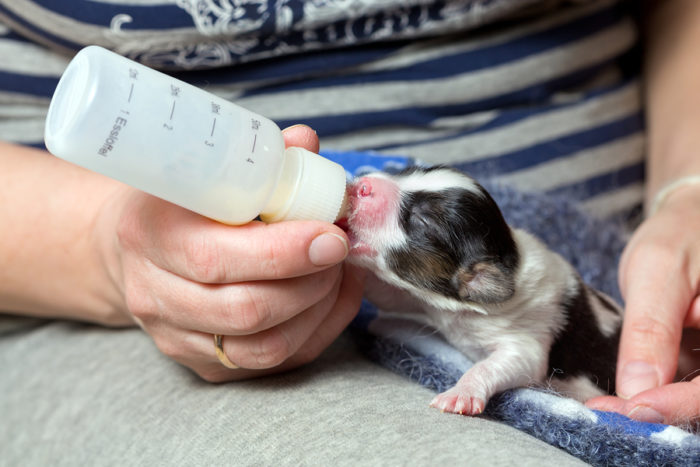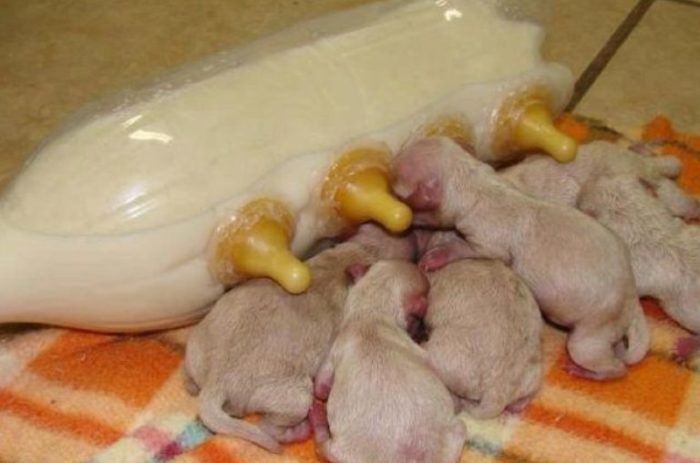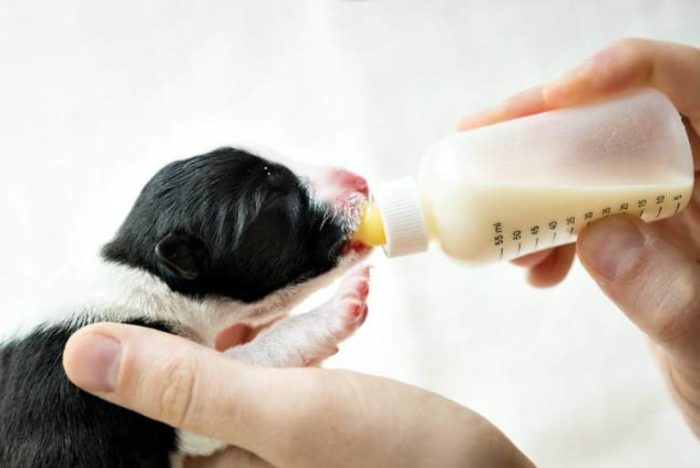A mother’s breast milk is the major nutritional requirement for raising healthy puppies. However, we have witnessed several cases where a bitch’s mammary gland fails to produce enough milk, making it impossible for her to nurse her litter. Situations abound where a bitch dies after childbirth, leaving a litter of orphaned puppies. Also, bitches can reject their puppies at birth, or fall ill. These kinds of situations call for an alternative milk supply, which is where orphaned puppies feeding tips come in handy.
Fortunately, there are a plethora of commercial puppy formula products and emergency milk replacement recipes through which pet parents can meet their newborn puppy’s nutritional needs. Note that having knowledge of alternative milk supply is not enough, a puppy’s caregiver ought to master the proper and safe way of bottle feeding the tender puppies.
Table of Contents
Is formula a necessity for all puppies?
When puppies feed on their mother’s milk for the first eight weeks of their lives, the accompanying benefits go beyond just nutrition. In addition to having a healthy and well-developed pup, you will also notice that their behaviors as adult dogs will be better. Thus, it is recommended that newborn puppies are nursed by their mothers as much as possible. However, in situations where a bitch falls sick, dies, is absent, or rejects her litter, then, you have no choice but to consider the available alternatives milk supply.

How important is a mother’s milk to her puppies?
Relative to other mammals of similar ilk, newborn puppies are too immature at birth and it should be noted that the puppies from smaller breeds are even more mature than those from larger breeds. The period puppies spend with their mothers as they nurse them to maturity greatly assists in their transition to eating solid food.
The health and growth of puppies that are nursed on their mother’s milk are influenced by the following:
- The mother’s nutrition during gestation and early lactation
- The behavior and overall physical health of the mother, including good neonatal care
The first milk a puppy gets from the mother is called colostrums which has a very high protein content and also transfers vital immune system elements. If the situation permits, newborn puppies must get the colostrums from their mothers as much as possible. This is what sets the pup for standard immune system function, as well as protection from diseases.
On occasions where a bitch is incapacitated and cannot personally raise her litter, the newborns are classified as orphaned puppies, and to ensure their survival, there are vital needs that must be met, including;
- Appropriate heat
- Humidity
- Nutrition
- Elimination
- Sanitation,
- Social stimulation
Bottle-feeding a newborn puppy
There are a plethora of milk replacers in the pet stores in your neighborhood. These newborn puppy formulas have clearly written instructions that must be followed carefully. The correct amount of water for the formula must be measured out as taking the wrong quantity can lead to serious consequences like diarrhea or constipation in your fur buddy.
Special nursing bottles called pet nursers are usually used in feeding puppies. They will suckle and let go when they are full. The bottle normally has a nipple with a small hole where the milk will be dripping out slowly.
The hole in the nipple shouldn’t be too large as it is recommended for the pup to suck out the milk against it falling into his mouth.
The feeding puppy should be on its stomach with its head upright; this is the best position for bottle-feeding.
Force-feeding a puppy is an option that should never be considered and it is not wise to overfill its mouth.
Incorrect feeding may give rise to pneumonia.
Caring for any orphaned animal must be done with support from a licensed vet as these young animals are very vulnerable and can fall sick easily. This calls for careful monitoring.

Orphaned puppies feeding – how often and how much should orphaned puppies be fed?
The schedule for feeding orphaned puppies is a strict one, preferably, they should be bottle-fed every two to four hours.
From two weeks and above, puppies’ daily intake can range from four to five meals in a day. In order to avoid diarrhea in small breed pups, their ration must be limited to 10 to 15mL per feeding during their first week of life.
The label on commercial milk replacers are there to aid pet parents in calculating the appropriate total volume/quantity to be fed daily.
The total amount of milk to be fed per meal is calculated thus;
- Dilute the total daily quantity/volume of the milk to a final volume of around 180mL/kg of the puppy’s body weight.
- Divide that total milk replacer into the preferred number of meals you wish to feed the pup per day.
- The recommendations are that puppy milk replacer should be warmed to approximately 100°F (38°C) prior to feeding, however, care should be taken to ensure that you do not overheat it.
- Regurgitation, bloating, aspiration, and diarrhea can result from a cold formula, overfeeding, and overly rapid feeding rates.
- In the event that an orphaned puppy under your care develops diarrhea, the volume of formula should be reduced as slightly underfeeding is better than overfeeding with neonatal orphaned puppies.
- An orphaned puppy’s sole source of nourishment should be the puppy milk replacer for about three to four weeks, following which the weaning process commences.
- Transiting from milk replacers to solid kibble is a gradual process that involves a lot of patience. A high-quality diet formulated to support both growth and reproduction is recommended for the transition period.
- At the onset of weaning, small quantities of semi-solid and solid food can be introduced to supplement formula.
- By five to six weeks, the puppy will be fully into solid food.
The nutritional needs of orphaned puppies
Orphaned puppies need water critically, even as they grow older. However, water intake at the newborn puppy stage is relatively high – 130-220 mL (milliliters ) of fluid per kg (kilogram) of body weight daily. Averagely, the total daily intake (including formula) should be roughly 180mL/kg of the newborn puppy’s body weight.
The milk from a bitch is calorie-dense and highly digestible. Relative to cow’s milk, a bitch’s milk contains higher than twice as much protein. With this explanation, it is easy to deduce why orphaned puppies should not be ideally fed with cow’s milk.
It is suggested that commercial puppy milk replacers be used as they are considered to be superior to both homemade mixtures and cow milk. Any brand of milk replacer you pick must meet a number of key nutritional factors.
For every 100g of formula/milk replacer you feed a puppy (on a dry matter basis), it should contain:
- 33g crude protein
- 42g fat
- 14.5g lactose
Read Also: 10 Worst Dog Breeds For Children: These Dogs Are Less Toddler-friendly
Tools needed for orphaned puppies feeding

The tools used in feeding your newborn puppy are highly dependent on the breed size. Any of these may suffice;
- A small syringe (3ml)
- Feeding bottles specially designed for puppies and kittens
- Baby bottles with nipples specially designed for human babies that were born prematurely
- A sponge
- A tube
- A feeding bottle with multiple nipples can serve many puppies at the same time
If you purchase a nipple without a hole, pierce two holes in it using a sterilized needle; this allows the milk to slowly drip out instead of running out when the feeding bottle is upside down. If allowed to run, the milk might choke the puppy and it can also breathe the substance in (aspirate)
